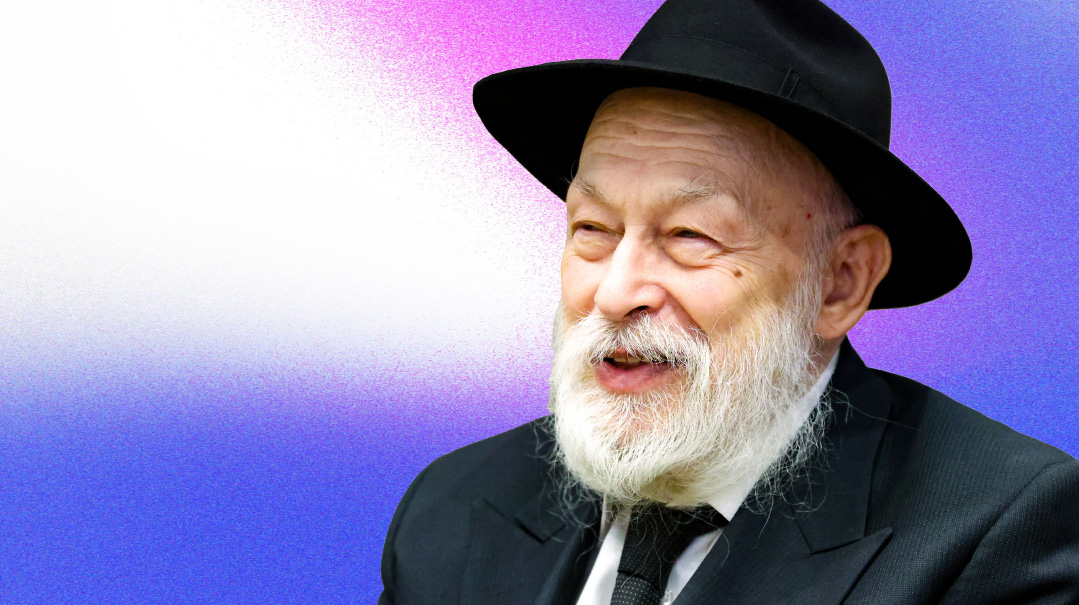Double Brachah

Twin brothers born 20 minutes apart, married twin sisters born 20 minutes apart — and had daughters, 20 minutes apart

Twin brothers Niv and Ron Cohen with Niv’s daughter Faigy and Ron’s daughter Shaindy (Photos: Menachem Kalish)
The picturesque town of Yavne’el in the Lower Galilee is one of the oldest rural Jewish communities in Israel. Known fondly as “Breslov City” it’s home to hundreds of families who adhere to the teachings of Rav Eliezer Shlomo Shick ztz”l.
“There’s a special kedushah here” says Blimi Fish who leads me through the streets of Yavne’el with the expertise of a veteran resident. The energetic mother of three invites me into her home to meet her twin daughters Leah and Rivky and her granddaughters who made headlines around the world in July 2015.
On 3 Av Leah gave birth to a baby girl Faigy in the afternoon. Twenty minutes later her sister Rivky gave birth to a baby girl Shaindy. The timing was uncanny since Leah and Rivky themselves were born 20 minutes apart. And there’s more: Leah and Rivky are married to identical twin brothers Niv and Ron who were born… 20 minutes apart.
The media flooded the hospital when they heard about the miraculous timing of the births. “We received interview requests from all over the world: from a newspaper in Romania, the German media, a Yiddish newspaper, The Tribune, leading newspapers in Israel, and others,” says Leah, who sits on a striped corner couch next to her sister Rivky. “We had no privacy after birth. It was difficult because I wanted my husband by my side, but he was busy with interviews for the media… I let him do it because I knew that it would make a kiddush Hashem.”
And indeed it did. Blimi tells me about a recent visit to Tel Aviv, where Rivky received a certificate for completing a makeup course. “A lady in the audience was a twin herself, and when we told her that Rivky is a twin who’s married to a twin and gave birth together with Leah’le, she remembered the story that was publicized in the media. She told us that her whole family was moved by the incredible Divine Providence.”
Rivky shares a humorous story from her stay in the hospital. A few days after giving birth via cesarean, she visited the cafeteria and a woman said to her, “Did you hear about the twins who got married to twins and gave birth at the same time? Don’t you think that’s a ridiculous story? I can’t believe it.”
Smiling at the woman, Rivky said, “That’s me. I’m a twin and my husband’s a twin, and my sister and I gave birth at the same time…” She looked at Rivky in shock, and after recovering, immediately asked to take a picture with her.
As Blimi and her daughters speak, little Faigy and Shaindy are at their feet, babbling to each other. Despite being cousins, they look like twins. “They have a language that isn’t really understandable, but they make each other laugh,” says Blimi.
The “Fishettes”
Though Niv and Ron are identical, Leah and Rivky look like two sisters. I ask them what it was like growing up as twins. “Rivky and I have an extremely special relationship,” begins Leah. “We’re the best friends in the world. All my phone calls are either to my mother or to Rivky.”
Growing up, they didn’t always see eye to eye. Yet the arguments never led to fights. “We never went to sleep in middle of an argument,” says Rivky. “It wasn’t an option in our house. We were together in preschool, but were in separate classes in elementary school, to prevent competition. It’s to our mother’s credit that she nurtured the strong points in each of us.”
For high school, they attended Rav Shick’s Bais Malka. It had only one class per grade and they sat next to each other. “We were one bloc. They called us ‘the Fishettes.’ ‘Did you ask the Fishettes?’ ‘Did you invite the Fishettes?’ That’s how it was.”
But the twins don’t have the same personality. “Leah’s more serious, settled. A girl made for school and books,” Rivky says.
“Rivky’s the mischievous one. She loves freedom and friends,” rejoins her twin. “She would come to school just for the social aspect. I like learning and tests.”
Even in the elementary school years, when they were in different classes and each had their own group of friends, Leah always watched out for Rivky, as a true older sister would. Rivky imitates her older sister in the tone of a Jewish mother. “Class started, where are you? The teacher’s waiting. Did you do your homework? Did you prepare your schoolbooks? Straighten up your desk! On trips, Leah made sure that I didn’t get too wild.”
“You broke your arm on a trip,” Leah admonishes. “What could I do? I had to watch you… I always had to take handouts for you too. Your desk was a mess and you would lose yours.”
Rivky laughs, and then turns serious. “At the end of the day, it’s only due to her that I fully matriculated… I don’t have a head for school, and she would study with me devotedly.”
Twin Telepathy
More than two decades into mothering twins, Blimi is still astounded by the telepathic connection between her daughters — and her sons-in-law. “One couple came to eat by us on Friday night and related a nice story. The other couple ate by us on Shabbos day and told the same story,” she shares. “One says something without her twin hearing, and suddenly the other twin comes in and says, ‘Ima, you have to hear…’ and she continues the sentence that her sister started.
“This mental telepathy existed from the time they were born,” Blimi continues. “When they were a week-and-a-half old, Rivky was hospitalized. When Leah’le cried at home, we knew that Rivky was crying too. Initially I didn’t think they had mental telepathy because they’re not identical twins, but I discovered very quickly that I was mistaken. That’s the nature of the relationship between twins. They have a special connection from infancy.”
Blimi recalls a small episode that had occurred recently. “The twins were buying shoes. Rivky left the store to speak on her cell phone. In the meantime, Leah’le tried on shoes. When Rivky finished her conversation and came back into the store, she asked the saleswoman to bring her shoes. And which shoes did she choose from the large selection? Exactly the ones that Leah tried on. Things like this happen all the time.” The sisters laugh and Rivky adds, “At times we arrive at the preschool where we work together, dressed in the same outfits, without coordinating it in advance.”
And as if to confirm Blimi’s words, I see the mental telepathy, live.
Rivky left the room to prepare a bottle for her baby. In the interim, Leah told me about the relationship between the babies and their fathers. The babies recognize their mothers, but can’t differentiate between the fathers. “When my husband enters the room, both babies demand his attention,” she says.
I ask Leah if her husband Niv pays attention to his niece. “He’ll hug her, and then put her down after a minute,” Leah responds. We continue to chat about the matter, and Rivky comes back into the room, shaking a bottle. When she hears the topic of conversation, she says in the exact same tone that her sister said a minute before, “My husband will hug Leah’le’s Faigy, but put her down after a minute.”
She doesn’t understand why we burst out laughing.
Waiting for a Shidduch
When the twins reached marriageable age, a lot of shidduchim were suggested for them. “They’re considered very good girls,” Blimi says proudly. “But we only wanted Rav Shick as their shadchan. He was like the father of the kehillah. He gave personal attention to everyone and knew what was going on in each family, in detail. In his lifetime, he made over 2,000 shidduchim.”
While the Fish girls waited for the Rebbe to suggest a match, all of their classmates got married. “At the age of 19-and-a-half, we were the old maids of the class,” says Rivky. “We felt forsaken.”
Blimi remembers going in to ask the Rebbe about the girls. “He would say, ‘The time hasn’t yet come.’ ”
One day, Blimi saw a pair of identical twins who had recently moved to Yavne’el. “It crossed my mind that perhaps they’re good for my girls, but it was a fleeting thought, no more than that,” she says.
How Niv and Ron Cohen ended up in Yavne’el is a story in itself. They were born in the Gilo neighborhood of Jerusalem to a religious Zionist family. At the age of 17, the twins heard Rav Ravid Nagar’s shiurim, and over time became his disciples. They went to his shiurim in Rechovot consistently and, under his supervision, decided to go to yeshivah gedolah. They spent two years in a litvishe yeshivah where they grew in Torah and became chareidi.
And then an acquaintance told them about Rav Shick from Yavne’el and recommended that they visit there for a Shabbos. On Friday night after Maariv, they passed before the Rebbe to receive his “Gut Shabbos” wishes. He shook their hands and then requested, “Remain here.” They were enchanted by the kehillah and the atmosphere, and stayed.
They arrived in Yavne’el dressed as litvishe yeshivah bochurim, and today they’re chassidim with shtreimlach, curly peyos, and woolen tzitzis over their shirts. It’s not just the clothing — the two became Breslover chassidim in every sense of the word.
Like Leah and Rivky, the Cohen twins have a very close relationship. They never do anything alone. “One is always in the other’s kishkes,” as their wives define it.
A year after the twin brothers joined the kehillah, the Fishes had a private audience with the Rebbe. “It was before Purim,” Blimi recalls. “The Rebbe said, ‘I have an excellent shidduch for the twins — a set of twins.’ He invited the girls to have their dates in his house, and subsequently to break a plate.”
The girls met the boys in the Rebbe’s house at the same time. Niv and Leah sat in the library, Ron and Rivky in the living room. It quickly became clear that the Fish twins were very suited for the Cohen twins. The girls are musical and know how to sing; the boys adapt and compose songs. The girls like to bake and know how to create magnificent creations; the boys cook like professional chefs.
“Rivky and I would arrange dates for the same time and get ready together,” Leah remembers. “Afterward, we would discover that we discussed the same topics.” Blimi relates how the girls would say Mizmor L’sodah for every good thing that happened to them. On their dates, they discovered that the twins had the same exact practice.
After a short dating period, the girls got engaged. “Despite the joy we felt,” Blimi shares, “the thought that two of my three girls were going to leave the house at once, was difficult for me.”
Leah chimes in, “Very symbolically, when Ima came to break the plate, she threw it, but the plate didn’t break. It didn’t break on the second try either. ‘It’s hard for me to let go of my daughter,’ Ima said to the Rebbe. And then he said, ‘Let go of her and break it!’ Then the plate broke.”
Twenty minutes later, they held the plate-breaking ceremony again, this time for Rivky. “The second time, the plate shattered into smithereens…. How much emotional strength you need for a simchah, and here there were two simchahs at once,” Blimi says.
The Rebbe’s Brachah
During the three-month engagement period, the Fish family came onto hard times financially. “We had plans for how to marry off the girls, but unexpectedly, all the sources dried up,” relates Blimi. “We didn’t have a cent. We simply didn’t have. And we had to set up two houses, buy four sheitels, clothing for the wedding, two sets of Shas, two Kiddush cups, two watches, two wedding gowns, not to mention pay rent on two apartments. Everything was double. It’s so hard to marry off children when you don’t have the means.
“We went to the Rebbe and he dismissed us with some noncommittal statement. The same thing happened the second time. The third time, I went in crying. ‘Why are you crying?’ the Rebbe asked me, ‘Hashem will help by sending you great heavenly blessings, and you’ll make the weddings very modest, modest, modest.’ ”
Throughout the engagement period, the uncompromising principle was modesty. Even when the mechutanim wanted to pay for the wedding food to be on a higher standard, the Fish family wouldn’t accept their offer. “For years we dreamed about what our weddings would look like,” says Rivky. “We dreamed of the buffet we’d set up, the decor, the setup of the tables, but the Rebbe said, ‘Modest, modest, modest’ — and we did as he said.”
Just as the Rebbe predicted, “heavenly pipelines opened for us,” says Blimi. “All the ladies of Yavne’el opened their hearts.” Incredibly, the Fish family was able to make a double simchah without going into debt.
When Blimi and the twins went shopping for the wedding, they encountered innumerable raised eyebrows. “On our wanderings and shopping trips, we were greeted by a polite saleslady in almost every store. ‘So who’s the kallah?’ she would ask, and both twins would answer, ‘Me!’
“The saleslady would get momentarily confused. ‘One minute. Both of you?’ And then the girls would repeat what made us celebrities in every store: ‘Yes. We’re twins and we’re getting married to identical twins, a few days apart. Therefore, we need two of everything…’ In every store, and I mean every store, we became the talk of the day… The chassanim had the same experience.”
Together but Separate
After the weddings, Leah and Rivky opened a private kiruv preschool for local children, and they work there in the mornings. In the afternoon, Leah’le runs aerobic classes for girls and Rivky does sheitels and makeup. Naturally, their husbands Niv and Ron learn together in the same kollel.
To prevent harmful comparisons and for tzniyus reasons, the couples don’t sleep in each other’s homes, don’t travel to their in-laws together, don’t eat Shabbos seudos together on their own, and don’t have joint conversations. Despite the close relationship between each set of twins, each couple has their private territory, “Mah tovu ohalecha Yaakov — How goodly are your tents Yaakov.”
When the two couples found out the exciting news of an impending birth, they decided not to share it with anyone, not even the other couple. “In our circles, such things aren’t discussed. People don’t tell anyone such news,” says Blimi.
Since Rivky didn’t feel well, she asked Leah to do things at work for her. “I was also expecting, but wanted to prove to everyone that I’m strong,” relates Leah. “I schlepped a ladder, picked up the children, all the while Rivky davened for good news for me.”
When Rivky later discovered Leah had been expecting all along, she was elated — but also felt terrible for asking her to do extra work. “I asked her to forgive me.”
Leah and Rivky ended up going to the hospital at the same time to deliver. “I ran from room to room,” remembers Blimi. “It was stressful and exciting at the same time, scary and joyous. At 1:10 p.m. I received the most exciting news in the world: I became a grandmother! Leah’le my oldest daughter had a baby girl!
“I immediately ran to the operating room, where Rivky was waiting to be admitted for a cesarean. I sat beside her and we both cried from excitement. At 1:30 p.m., 20 minutes after the birth of my first granddaughter, 20 minutes after I became a grandmother, they came out and told us, ‘Rivky had a girl!’
“Those moments are indescribable… They’re impossible to understand. It was incredible, great gifts. Yes, I became a grandmother two times over!”
The sisters shared a room and received their many joint visitors together. “Even after birth, I played the role of the older sister,” says Leah. “I was recovering from the birth of my first child with all that that entails, but Rivky was recovering from a cesarean, so I took care of her.”
Nachas Times Two
Niv and Leah Cohen named their daughter Faiga Shifra, and call her Faigy. Ron and Rivky Cohen chose the name Chaya Shaindel for their daughter, and she’s called Shaindy. The two babies received consecutive identity numbers just as real twins do.
“Genetically speaking, they’re twins,” says Blimi, referring to a study that she read. “Children of twins whose mothers and fathers are twins have DNA like siblings do. And since the babies were born at the same time, they’re in effect, twins. They have matching clothing, wear the same size diapers, and are developing at the same rate.”
Leah adds, “I don’t know about studies. But I love Rivky’s Shaindy exactly like I love Faigy. It’s as if she’s my daughter.”
Blimi characterizes her granddaughters with grandmotherly pride. “Both Faigy and Shaindy remind me a lot of their respective mothers — both in appearance and in personality. When Leah’le and Rivky were their age and had to go down a step, Leah’le would look carefully, slowly lower one leg, and then the other, taking care not to fall. Rivky, on the other hand, saw a step and didn’t think too deeply. She simply went down, even if she would fall. Faigy and Shaindy are exactly the same way.
“Leah’le’s Faigy is cautious and thought out. Shaindy, in contrast, is brave, goes with the flow, and even enjoys falling somewhat, just like her mother. It’s very interesting, that the baby of the one who liked a pacifier, acts like her mother. The twin who didn’t really like a pacifier and was weaned from it easily, has a baby who doesn’t enjoy a pacifier.”
Since Faigy and Shaindy spend all morning in daycare together (their mothers are their caregivers), their personalities are being shaped together. Despite being just a year old, you can see that they’re aware of the fact that they have each other — they’re happy to meet in the morning and show signs of wanting each other.
Around twice a week, Niv and Ron visit their wives and daughters at the preschool during their kollel’s break. “One of the fathers goes into the daycare,” describes Blimi, “and his identical twin brother’s daughter is certain that it’s her father, and wants him to pick her up. Then, his brother, the real father, arrives. The baby looks back and forth from one to the other, trying unsuccessfully to figure out which one is her father… They both call to her, ‘Come,’ and she can’t decide which one to go to. It’s a very amusing moment.”
Reflecting back on the whirlwind of the past few years, Blimi says, “Baruch Hashem, I feel that Hashem has repaid me for my emunas chachamim. More than once, along the way, it was hard for me to submit my will, but whoever listens to chachamim gains. Indeed, I gained doubly.”
(Originally featured in Family First, Issue 503)
Oops! We could not locate your form.












